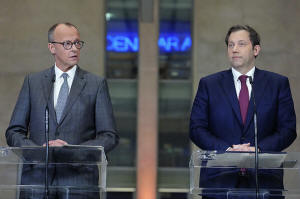Germany to ease government debt limits in major step aimed at boosting
economy, defense spending
[March 06, 2025] By
DAVID McHUGH
FRANKFURT, Germany (AP) — The two political parties expected to form the
next German government have agreed to loosen the country's constitution
restrictions on borrowing, enabling 1 trillion euros ($1.08 trillion) or
more in spending on defense and infrastructure.
It’s a major change in Germany’s debt-averse political culture,
rejecting conventional economic wisdom that long dominated Europe’s
biggest economy and one of the world’s wealthiest countries.
Here are key facts about the debt brake and what the changes will mean
for Germany and Europe.
What is the debt brake?
The debt brake was passed in 2009, when a global financial crisis led to
sharp increase in government borrowing in Germany and around the world.
The debt brake also reflected cultural and political skepticism about
debt in general that for years left a deep imprint on German politics.
The debt brake limited new borrowing to 0.35% of gross domestic product
- a tight limit when compared to European Union budget rules requiring
less than 3%, and the 2024 U.S. federal deficit of 6.4%.
How did the debt brake work in practice?
The debt brake appeared to work fine for years - until it didn't. German
governments lived within the limits during the good times in the 2010s,
often running small surpluses.

But the pandemic, slowing growth and Russia's invasion of Ukraine put
the debt brake under severe strain.
The government had to invoke an emergency clause to borrow and spend
more on pandemic relief for businesses in 2020. Then it declared another
emergency in 2021, and another one in 2022 after Russia's invasion of
Ukraine raised pressure for more defense spending and relief for utility
customers. Yet another emergency exemption was used in 2023. However in
late 2023 the Federal Constitutional Court ruled the government had gone
too far in fudging the debt limit, forcing a frantic rewrite of the 2024
budget.
Then Social Democrat Chancellor Olaf Scholz's government collapsed in
November 2024 over disagreement with a coalition party, the pro-business
Free Democrats, over spending and the debt brake.
What does it mean for Europe’s defense buildup and efforts to support
Ukraine?
The reformed debt brake would remove the constitutional ceiling when it
comes to defense spending. That would support efforts to build up
Germany’s own defenses and its ability to further support Ukraine.
Germany is already a leading backer of Ukraine, sending 60 Leopard tanks
and 175 Marder infantry fighting vehicles as well as 27 air defense
systems, including three of its U.S.-made Patriot missile batteries.
“The extra room for defence spending sends a clear signal to Vladimir
Putin and Donald Trump as well as to Germany’s European friends that
Germany is serious about defending itself and helping Ukraine,” said
Holger Schmieding, chief economist at Berenberg bank.
“Germany is finally taking on the leadership role which, given its size
and its fiscal space, it should have assumed years ago.”
What exactly did Germany's political parties decide?
Leaders of the conservative Union bloc agreed with the center-left
Social Democrats to exempt military spending over 1% of GDP from the
debt limit, as well as a 500 billion euro infrastructure fund for civil
and disaster protection, transport infrastructure, hospitals, energy
infrastructure, education, scientific research and digitization.
Economists estimate that the measure, if passed, could enable a trillion
euros in new borrowing and spending over a decade.

[to top of second column] |

Friedrich Merz, left, leader of the Christian Democratic Union (CDU)
and Lars Klingbeil, co-leader of the Social Democratic Party (SPD)
address the media during a press conference in Berlin, Germany,
Tuesday, March 4, 2025. (Carsten Koall/dpa via AP, File)
 The agreement came during talks
aimed at forming a coalition government between the two parties.
It was a sharp turnaround for Friedrich Merz, who as Union leader is
the likely next chancellor after his party came in first in national
elections on Feb. 23. His party program rejected changes to the debt
brake, though he had indicated he might be open to negotiation on
that point.
The move “follows the old political principle: if
the facts change, I change my mind,” said Carsten Brzeski, global
chief of macro at ING bank.
The agreement reflects both long-term strains on the debt brake, and
the sudden recent shift in U.S. security policy under U.S. President
Donald Trump, who has demanded that Europe do more for own security,
disrupting the post-World War II transatlantic alliance under which
Europe looked to the U.S. as an ultimate security guarantor.
Trump's public disparagement of Ukrainian President Volodymyr
Zelenskyy in the Oval Office and decision to suspend military aid to
Ukraine have shocked European governments into facing the need for
vastly more defense spending to fill the gap left by a U.S. seen as
no longer committed to Europe's security.
Germany only met the NATO requirement to spend 2% of GDP on defense
through a 100 billion-euro special fund exempted from the debt brake
in 2022 - but that fund will run out in 2027.
Why did the parties act now?
The parties plan to rush the changes through the lame duck
parliament next week. That's because mainstream parties have the
needed two-thirds majority in the old parliament - but will lose
that in the new parliament due to electoral gains by the far-right
Alternative for Germany and the far-left The Left party who oppose
the changes.
The measure would still need votes in the outgoing parliament from
the environmentalist Greens, who weren't part of the coalition
talks.

What does it mean for the German economy?
Economists say the looser debt brake could help Germany emerge from
five years of economic stagnation by increasing spending on things
that promote economic activity over the long term. Skimping on
infrastructure spending has been blamed for trains that don't run on
time due to endless track repairs, crumbling bridges, declining
educational achievement levels, and lagging adoption of renewable
energy infrastructure and digital technology.
The morning after the announcement, economists started tearing up
old growth forecasts and raising their outlook. Morgan Stanley saw
the possibility of 0.2% more GDP growth this year and 0.7% more next
year. That would be welcome in an economy that shrank for the past
two years.
“Everything you thought you knew about Germany’s economic prospects
three months ago, or even three weeks ago, should be ripped up,”
said Jim Reid, research strategist at Deutsche Bank. “This is
game-changing if it goes through.”
The step is a “sea change” in German policy, said economist
Schmieding.
“The infrastructure fund signals that the new government will
seriously tackle key domestic deficiencies,” Schmieding said. “I
look forward to the day in the – probably still somewhat distant –
future when German trains may run as fast and punctual as those in
France, Switzerland or Austria.”
All contents © copyright 2025 Associated Press. All rights reserved |